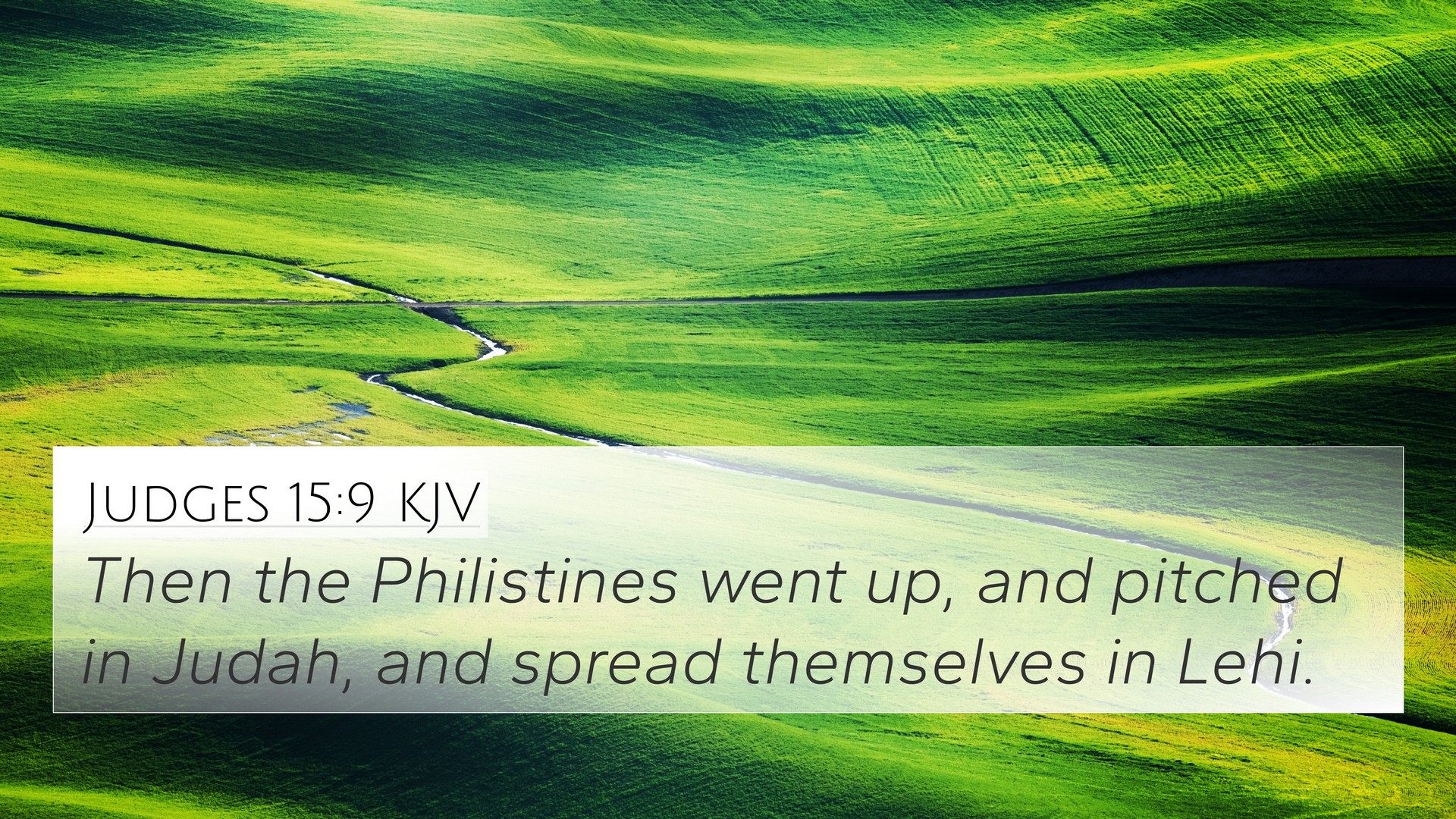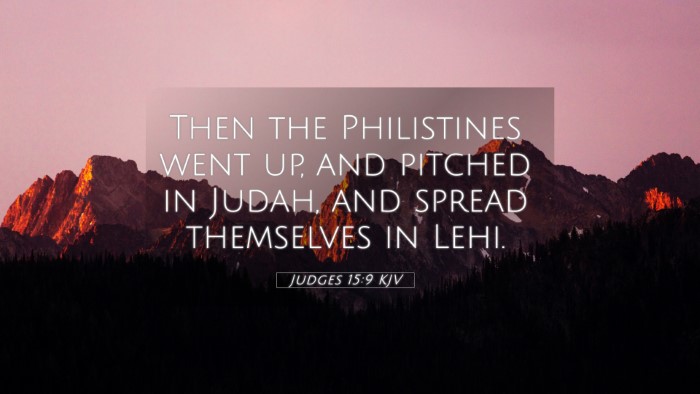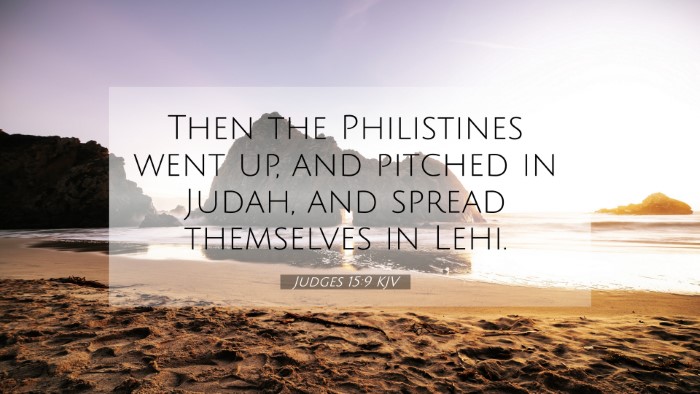Old Testament
Genesis Exodus Leviticus Numbers Deuteronomy Joshua Judges Ruth 1 Samuel 2 Samuel 1 Kings 2 Kings 1 Chronicles 2 Chronicles Ezra Nehemiah Esther Job Psalms Proverbs Ecclesiastes Song of Solomon Isaiah Jeremiah Lamentations Ezekiel Daniel Hosea Joel Amos Obadiah Jonah Micah Nahum Habakkuk Zephaniah Haggai Zechariah MalachiJudges 15:9 Similar Verses
Judges 15:9 Cross References
Then the Philistines went up, and pitched in Judah, and spread themselves in Lehi.
Uncover the Rich Themes and Topics of This Bible Verse
Listed below are the Bible themes associated with Judges 15:9. We invite you to explore each theme to gain deeper insights into the Scriptures.
Judges 15:9 Cross Reference Verses
This section features a detailed cross-reference designed to enrich your understanding of the Scriptures. Below, you will find carefully selected verses that echo the themes and teachings related to Judges 15:9 KJV. Click on any image to explore detailed analyses of related Bible verses and uncover deeper theological insights.
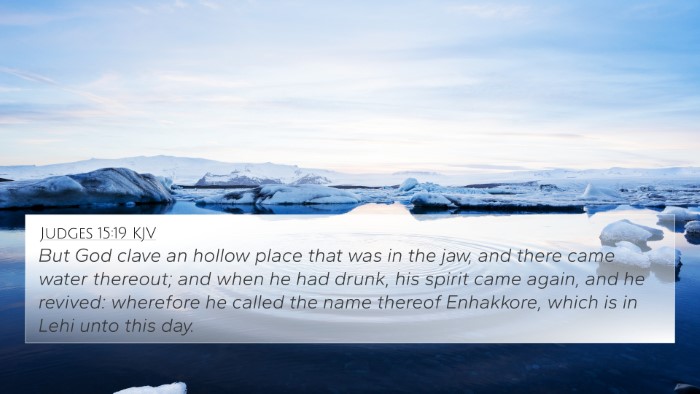
Judges 15:19 (KJV) »
But God clave an hollow place that was in the jaw, and there came water thereout; and when he had drunk, his spirit came again, and he revived: wherefore he called the name thereof Enhakkore, which is in Lehi unto this day.
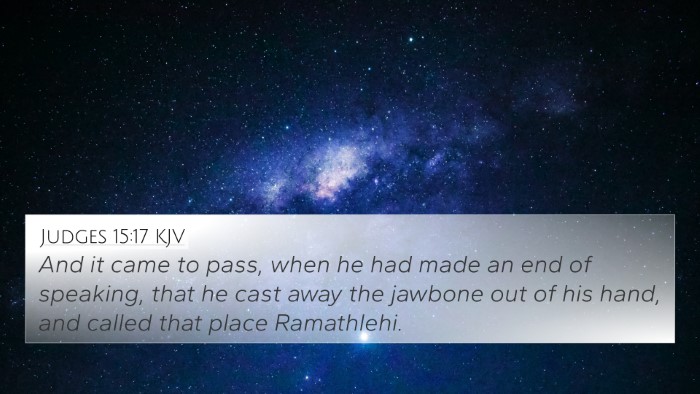
Judges 15:17 (KJV) »
And it came to pass, when he had made an end of speaking, that he cast away the jawbone out of his hand, and called that place Ramathlehi.
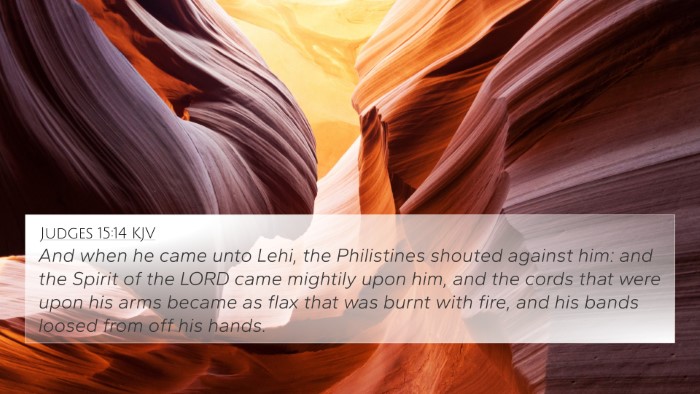
Judges 15:14 (KJV) »
And when he came unto Lehi, the Philistines shouted against him: and the Spirit of the LORD came mightily upon him, and the cords that were upon his arms became as flax that was burnt with fire, and his bands loosed from off his hands.
Judges 15:9 Verse Analysis and Similar Verses
Understanding Judges 15:9
Judges 15:9 states: "Then the Philistines went up, and pitched in Judah, and spread themselves in Lehi." This verse depicts the Philistines' aggressive stance against the people of Judah, setting the stage for conflict and highlighting the tension between Israel and its enemies during the time of the judges.
Thematic Insights
The confrontation between Israel and Philistia illustrates key themes in the Book of Judges: the cycle of sin, oppression, repentance, and deliverance. It showcases the recurring struggle of the Israelites against their oppressors, a central narrative throughout the biblical text.
Comprehensive Analysis
Scholars highlight the significance of this confrontation in understanding Israel's constant struggle for autonomy and peace. The Philistines were a powerful adversary, and their encroachment indicated not only a physical threat but also spiritual challenges for the Israelites. This theme resonates with various biblical lessons about reliance on God amidst adversity.
Commentary Insights
- Matthew Henry: He emphasizes the destructive nature of the Philistine invasion, underscoring how their actions reflect mankind's enmity against God’s people. Henry draws connections to the larger narrative of God’s sovereignty over Israel and His eventual deliverance.
- Albert Barnes: Barnes notes that the Philistines’ decision to spread in Lehi is both a military strategy and a deliberate act of provocation. He discusses the implications for Israel's security and faith, suggesting that this invasion was part of God’s plan to raise a deliverer in Samson.
- Adam Clarke: Clarke contextualizes the verse historically and geographically, providing insights into the significance of Lehi. He also highlights the Philistines’ long-standing feud with Israel, which serves as a backdrop for the narrative of Samson.
Key Cross-References
- 1 Samuel 13:5: The gathering of the Philistines at Michmash, reflecting continuous hostilities.
- Judges 14:1-3: Samson’s encounters with Philistines, setting the stage for his role as a deliverer.
- Judges 13:5: The announcement of Samson’s birth as a response to Israel's oppression.
- 1 Samuel 7:13: Israel's deliverance from the Philistines under Samuel’s leadership.
- 1 Chronicles 18:1: David's victories over the Philistines, illustrating eventual triumph.
- Psalm 60:8: A reference to God's sovereignty over the nations, including Philistia.
- Amos 1:8: Prophecies against the Philistines, indicating their ultimate downfall.
Conclusion
Judges 15:9 encapsulates a critical moment in Israel's tumultuous history, marked by conflict, divine intervention, and the overarching theme of deliverance. By investigating this verse through various commentaries, one gains deeper insights into its significance and the interwoven nature of scripture.
